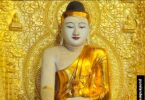
[1] Qualification: Those who have abandoned Pure Land practice have clearly not realised its immeasurable worth completely yet, as taught extensively by the Buddhas and Bodhisattvas. Thus, they should never teach it, as they are likely to share discounted and possibly warped versions of it. Buddhist traditions should be taught by those experienced enough; not those who have learnt and practised superficially. Inaccurate teaching can become a form of slander via misrepresentation, that discourages others from practice. Slander’s results are karmically horrendous: http://thedailyenlightenment.com/2014/12/why-slander-of-pure-land-is-especially-grave When taught, Faith as the first provision should always be built quickly; not disrupted or made shaky from the start.
[2] Confusion: When beginners encounter others presenting Pure Land practice in less skilful ways, this becomes hard to reconcile with what learnt well before. What makes things worse is if there is belief that all different views can be reconciled. Some wrong views cannot be harmonised with the actual Pure Land teachings at all. Sometimes, we place too much hopes and expectations on teachers, and when they teach not so accurately, we think we are foolish in not being able to grasp what they are saying. Sometimes, these teachers simply taught wrongly or unskilfully. We can reflect on how we can clarify. If some teachers are non-receptive, this should motivate us to step on the gas to learn, practise and share more clearer to counter the damage done.
[3] Differentiation: Pure Land practice is often misinterpreted by some with their limited understanding, while the actual practice is found in the sutras, and as further illuminated by the great Pure Land Patriarchs. Those who teach it inaccurately, who are not few, seldom delve into the Pure Land sutras and the Patriarchs’ teachings. As an analogy, we should only ask swimmers about swimming; not non-swimmers. Non-swimmers will sprout all kinds of possibly wrong theories about swimming while they do not swim at all. Part of right understanding arises from knowing where to draw the line between right and wrong understanding, instead of muddling up the line, thinking it is not there. Beginners should avoid confusion in the first place, and learn from proper teachers.
[4] Moderation: For classes on profound teachings, it is unwise to have split group discussions, especially if they are not moderated sufficiently by the skilled. Some teachings cannot be discussed well randomly without laying proper foundations. As mentioned by the Buddha himself, the Pure Land teachings are extremely difficult to teach as they are extremely difficult to cultivate faith in. To plant unresolved doubts is unkind and a great disservice to the Buddha. If a session ends with doubts, it was not skilful or fruitful. Those not specialised should not initiate vague discussions, or there can be confusion instead of clarity. Some might never return to learn clarified teachings later, if it is even offered. Creation of various chat groups with inadequate moderation also allows the vocally wrong to dominate the conversation, furthering confusion easily and quickly. [Note: These points do not refer to any specific class.]
Related Article:
15-Point Proof For Authenticity Of The Pure Land Teachings
Here is the golden link to solve this: https://purelanders.com/2014/09/26/15-point-proof-for-authenticity-of-the-pure-land-teachings





